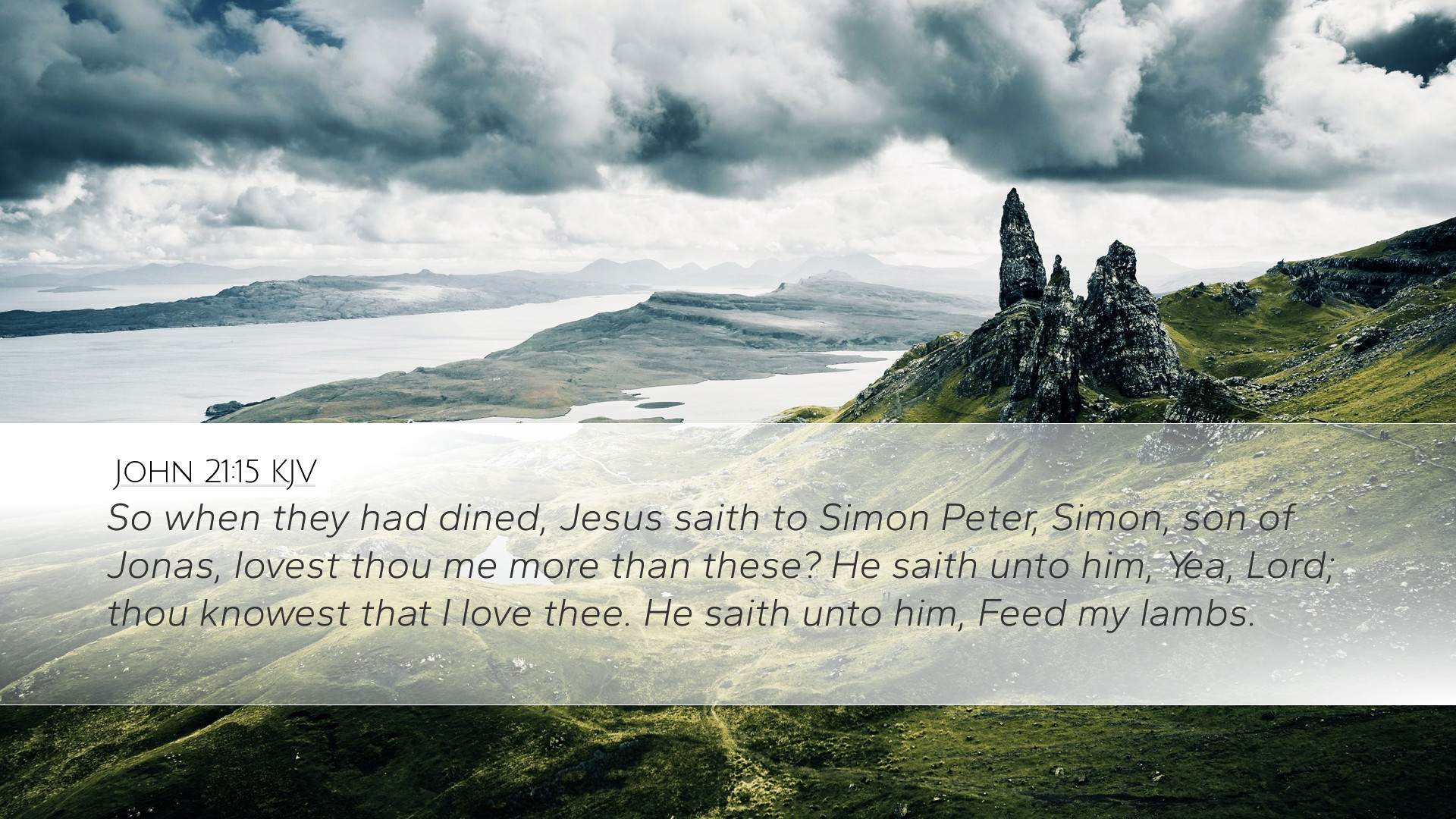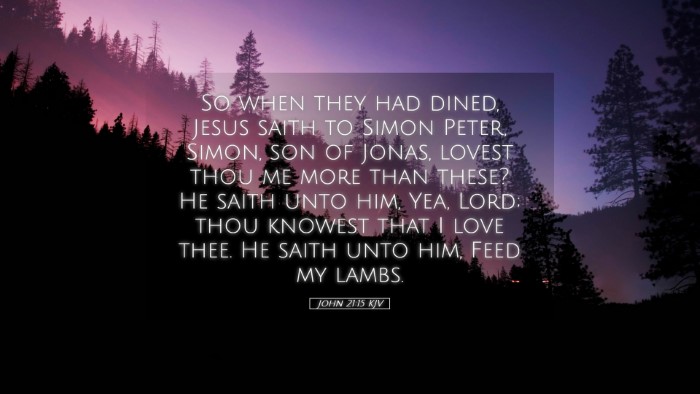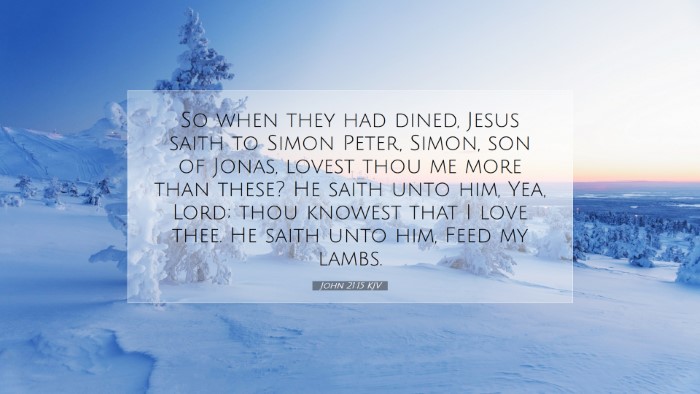Old Testament
Genesis Exodus Leviticus Numbers Deuteronomy Joshua Judges Ruth 1 Samuel 2 Samuel 1 Kings 2 Kings 1 Chronicles 2 Chronicles Ezra Nehemiah Esther Job Psalms Proverbs Ecclesiastes Song of Solomon Isaiah Jeremiah Lamentations Ezekiel Daniel Hosea Joel Amos Obadiah Jonah Micah Nahum Habakkuk Zephaniah Haggai Zechariah MalachiJohn 21:15
John 21:15 KJV
So when they had dined, Jesus saith to Simon Peter, Simon, son of Jonas, lovest thou me more than these? He saith unto him, Yea, Lord; thou knowest that I love thee. He saith unto him, Feed my lambs.
John 21:15 Bible Commentary
Commentary on John 21:15
John 21:15 states: "So when they had dined, Jesus saith to Simon Peter, Simon, son of Jonas, lovest thou me more than these?" This verse is pivotal in understanding the reinstatement of Peter and offers profound theological insights into the nature of love, discipleship, and the call to ministry.
Context and Immediate Background
The setting of this verse is significant. It follows the resurrection of Christ and occurs by the Sea of Tiberias, emphasizing a moment of fellowship and restoration. After the disciples' return to fishing, reminiscent of their previous calling (Matthew 4:19), Jesus approaches them to re-establish Peter’s ministry.
Insights from Public Domain Commentaries
Matthew Henry's Commentary
Matthew Henry emphasizes the relational aspect of Peter’s love for Christ. He notes that the question posed to Peter, "lovest thou me more than these?", is deeply probing, suggesting a need for Peter to reflect on his priorities. Henry highlights that the term "these" likely refers to both the other disciples and the earthly possessions represented by the fish, challenging Peter to affirm his love in a context that transcends human relationships and material comforts.
Albert Barnes' Notes on the Bible
Barnes delineates the importance of Jesus’ inquiry into Peter's love, suggesting it signifies a re-examination of Peter’s heart. Barnes elucidates that the repetition of the question is intentional, designed to match Peter's prior denial of Christ (John 18:15-27). The thrice-repeated question serves as a mechanism for Peter's restoration. Barnes posits that Jesus is teaching that love for Him must precede and undergird Peter’s future ministry and service.
Adam Clarke's Commentary
Adam Clarke focuses on the Greek terms used for "love." He carefully distinguishes between philos (brotherly love) and agape (sacrificial love). Clarke argues that Jesus first asks Peter if he possesses a brotherly affection for Him. When Peter responds affirmatively, Jesus follows up with a deeper inquiry about agape love. This progression signifies the need for Peter to cultivate a robust, self-sacrificial love that would empower his apostolic mission.
Lessons for Discipleship and Ministry
This passage is rich with implications for contemporary discipleship:
- Love is Central: The emphasis on love is paramount. Discipleship begins and ends with love for Christ, which affects all areas of life and ministry.
- Restoration is Possible: Peter’s restoration demonstrates that failure does not preclude future service. Christ's redemptive grace enables a return to purpose.
- Service Stemming from Love: Jesus follows His inquiry with a command to "feed my lambs" (John 21:15). Love for Christ is the foundation for the call to serve others in ministry.
Theological Implications
From a theological perspective, John 21:15 encapsulates key themes related to the nature of Christ’s resurrection ministry, the role of love in our relationship with God, and the transformative power of grace. The dialogue between Jesus and Peter reflects the ongoing conversation within the heart of every believer regarding allegiance to Christ versus worldly attachments.
In engaging with this text, pastors and theologians are encouraged to consider:
- The nature of their own love for Christ and how it informs their ministry.
- The importance of vulnerability in the face of personal failure and the grace to be restored.
- The imperative of directing their congregations not only to love Christ but to manifest that love in action.
Conclusion
John 21:15 serves as a profound reminder of Christ’s prioritization of love in the life of a disciple. It invites deep contemplative engagement and reaffirms the necessity of love as the cornerstone of ministry. As we reflect on Peter's journey of repentance and restoration, we must ask ourselves: Do we love Jesus more than anything else? And are we prepared to serve and shepherd others out of the overflow of that love?


